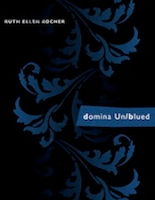domina Un/blued
Ruth Ellen Kocher
Tupelo Press, 2013
Paperback, 81 pages
ISBN 978-1-936797-25-7
Purchase Link
Reviewed by Andrew Ruzkowski, PQ Reviews Coordinator
Ruth Ellen Kocher’s fourth volume of poetry is perhaps the most intriguing book of poems I have read over the past year. domina Un/blued is a stunning example of palimpsestic writing. Kocher describes domina Un/blued as a “text…built upon the ruins of two previous manuscripts, Hybrids & Monsters and The Slave’s Notebook, now buried and visible only in glimpses when unearthed.” Excavation is at the heart of these poems: of the self, of the beloved (tenuously defined), of empire and its architecture, and of language. This is a book of poems kept aloft by tension in both form and content, this vibrance makes the collection read as a book-length work. There are struggles between slave and master, dominant and submissive, word and page, and even the English and Italian languages. Kocher’s use of white space creates an interplay between text and page that can aptly be described as atmospheric. Her words materialize out of a linguistic murkiness and meander, cloud-like, from page to page.
As suggested by the title, domina Un/blued explores dominance and dominion in myriad forms. Kocher writes in “Translation Exercise / Esercizio di traduzione,” a poem exemplifying the ebb and flow of language(s) and the master/slave vocabulary present in this collection:
i am the lock and the key io sono la serratura e la chiave
i am the key and the slave io sono la chiave e lo schiavo
i am the slave and the key io sono lo schiavo e la chiave
the keys i tasti
i belong to io appartengo a
my self not my sex me stesso, non il mio sesso
Lines lock, unlock, and shift between English and Italian throughout these poems, forming a rhythmic, reverberating cadence. This poem inoculates the reader with a sense of what the book will explore: the craft of ownership, sex, the body, and enslavement, just to identify a few motifs. There is a searching in this poem that serves as a microcosm for the book as a whole. Later on in the same poem Kocher writes, “the handcuffs begin with me / le manette iniziano con me…i do not belong here / io non appartengo a questo posto…i do not belong to you / io non ti appartengono.” The amorphous speaker of domina Un/blued is both shackled and unfettered. Consequently, the reader belongs to the text.
D/domina is a character/voice that rises and falls throughout the book. In fact, the D/domina poems, and there is a multitude, form the scaffolding within which this book is constructed. “D/domina: Issues Involving Translation” is a poem that invokes this character/voice/presence and (dis)arms the reader in a way that ensures he or she is ready, if not fully willing, to submit to these poems:
The slave owned not own nor owns
Nor evolves. Nor provision any make consonant belonging…
buildings behind the blue clouds gleam not a century old
un-ruined
Forum become column become a basket from beneath acanthus
climbs
These lines alert the reader to what is at stake here. What does it mean to own and be owned? What are the consequences of dominion and conquest, of both the body and geo-physical features? Is there any utterance capable of speaking the atrocities of enslavement and imperialism? These questions drive the manuscript, though it never falls into didacticism. Kocher concludes this poem, “black is the only thing the slave owns that is nothing…the writing done by the slave in a notebook belongs to no one / no one belongs to the slave,” as if to say the unsayable by proxy, through excavation and extraction, letting us know we are all guilty of some transgression(s).
As the manuscript progresses, Kocher investigates and ultimately employs the Corinthian column as a representation of empire, dominance, and the overseer/master. The poem “Un/blued” is a calligram of a Corinthian column in which the words “the columns are / capped with / acanthus / empire Empire / E/empire / baby, baby, o / baby / girl” are repeatedly arranged into three columns across the page. This hypnotic arrangement is a pleasure to look at and serves as a symbolic reminder of imperialism’s presence in contemporary life. For Kocher, it seems, empire is a pervasive force thinly veiled under the guise of globalism.
domina Un/blued is a poetic exertion from the mind of one of this country’s most important writers. This is a collection steeped, at times bilingually, in words that explore meaning itself, the function of language, the body as place, othering, and the consequences of love through the prism of empire. In the final poem of the collection, “D/domina: Issues Involving Interpretation,” Kocher states “The word has no life of its own despite what the writer / tells you…Language / crosses a clearing the stark way a thing revealed / when thinned clouds expose better light.” domina Un/blued exposes us to the beauty of ruin. Ruth Ellen Kocher’s palimpsestic resuscitation of two dormant manuscripts blooms like the acanthus into a masterful collection that is pensive, investigative, and haunted by love’s ghosts.
Andrew Ruzkowski lives and writes in Chicago. His poems have appeared or are forthcoming in Columbia Poetry Review, The New Writer, Willows Wept Review, Black Tongue Review, The Camel Saloon, Emerge Literary Journal, The Bakery, [PANK], Midwestern Gothic, and TAB, among others. His debut chapbook, A Shape & Sound, is currently available from ELJ Publications.

